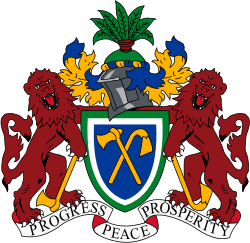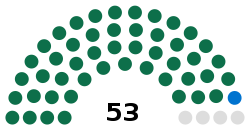National Assembly of the Gambia
| National Assembly | |
|---|---|
 | |
| Type | |
| Type | |
| Leadership | |
Speaker |
Abdoulie Bojang Since 12 November 2010 |
| Structure | |
| Seats | 53 |
 | |
Political groups |
Government (48)[note 1]
Opposition (1)
Non-partisan
|
| Elections | |
| First-past-the-post and appointments by the President | |
Last election | 29 March 2012 |
| Meeting place | |
| Parliament Buildings, Banjul | |
| Website | |
| The Gambian National Assembly | |
 |
| This article is part of a series on the politics and government of the Gambia |
| Constitution |
|
Legislative
|
|
The National Assembly is the legislative branch of government in the Gambia.
Composition and electoral system
The National Assembly is unicameral and consists of 53 members who serve a five-year term. 48 members are directly elected while the remaining five are appointed by the President. Members are elected in single-member constituencies using the simple majority, or First-past-the-post system.
History
Legislative representation based on universal adult suffrage in the Gambia began in May 1962, when elections were held for a 32-seat House of Representatives. These elections were won by the People's Progressive Party (PPP), which was led by Dawda Jawara. After independence in 1965, the PPP continued to dominate the House of Representatives by winning a series of free, democratic elections in 1966, 1972, 1977, 1982, 1987, and 1992. While opposition parties were continuously present in the House, they were never able to successfully wrest power from the PPP. Jawara's government was overthrown in a July 1994 military coup led by Yahya Jammeh. The constitution and all elected institutions, including the House of Representatives, were dissolved. After the coup, political party activities were banned. The ban was lifted in August 1996 following the approval of a new constitution, but three Jawara-era parties – the PPP, Gambian People's Party (GPP), and the National Convention Party (NCP) remained proscribed.
Legislative elections to the renamed National Assembly took place on 2 January 1997. Jammeh's Alliance for Patriotic Reorientation and Construction (APRC) won 33 out of 45 seats, the opposition United Democratic Party (UDP) won 7, two went to both the National Reconciliation Party (NRP) and Independents, while the People's Democratic Organization for Independence and Socialism (PDOIS) winning the remaining seat.
The Independent Electoral Commission (IEC) lifted the ban on the PPP, GPP, and NCP in August 2001, five months before the next scheduled legislative election.
2012 election
| Parties | Votes | % | Seats | +/– | |
|---|---|---|---|---|---|
| Alliance for Patriotic Reorientation and Construction | 80,289 | 51.82 | 43 | +1 | |
| National Reconciliation Party | 14,606 | 9.43 | 1 | – | |
| Independents | 60,055 | 38.76 | 4 | +3 | |
| Invalid/blank votes | 0 | – | – | – | |
| Total | 154,950 | 100 | 48 | 0 | |
| Registered voters/turnout | 796,929 | 38.71 | – | – | |
| Source: Independent Electoral Commission, IFES | |||||
Leadership
- Speaker – Abdoulie Bojang
- Deputy Speaker – ...
The Speaker and Deputy Speaker may only be chosen from among the presidential appointees to the National Assembly, not the elected members.[1]
See also
- History of the Gambia
- List of national legislatures
- List of Speakers of the National Assembly of the Gambia
- Legislative branch
Notes
- ↑ Includes 5 unelected representatives appointed by the president.
References
- ↑ Political Parties of the World (6th edition, 2005), ed. Bogdan Szajkowski, page 242.
External links
Coordinates: 13°27′37″N 16°34′53″W / 13.46028°N 16.58139°W